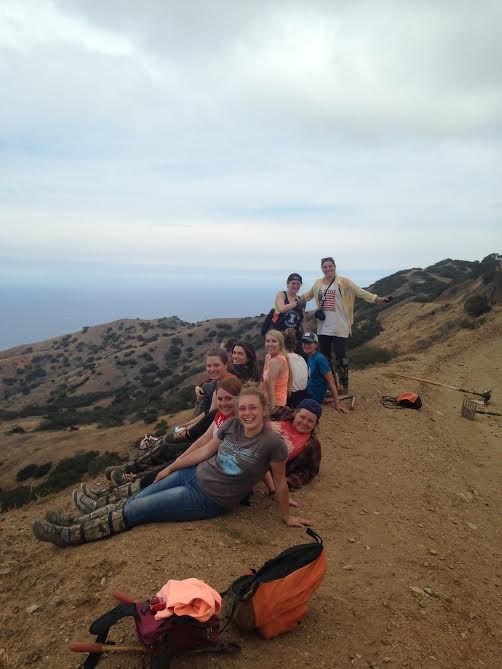Alternative Seasonal Breaks send volunteers nationwide
Feb 3, 2015
Many students picture their breaks from school on a beach, where they can relax and feel the sun on their faces. Anwen Parrott, an employee of Illini Media Company, public relations chair of the RSO Alternative Seasonal Breaks and junior in LAS, thought differently. Two years ago, she spent her freshman-year break in Athens, Ohio, volunteering for Good Works, an organization that works to help people struggling with homelessness and poverty. Her trip was made possible by the University’s Alternative Seasonal Breaks program, which has been sending students on service-oriented trips around the country during school breaks since 1989.
The program, which is run by the University YMCA, was started by a group of students who spent one of their breaks living among Central American refugees living under de facto martial law in Brownsville, Texas. Maria Somma, who was the program director of the University’s YMCA, organized the trip and took 22 students.
Twenty-six years later, the program continues to expand, now offering several trips to places across the nation during each break.
According to the organization’s website, ASB has a mission to “educate students about social, political and environmental issues through direct service, group reflections, student leadership, diversity and engagement beyond the local community.”
This spring break, ASB is offering seven trips total, with four that focus on environmental issues, according to Parrott. The deadline to apply to these trips was Dec. 19, 2014. Although there are now more environmentally-focused trips than in the past, Parrott said that the program tries to “appeal to a bunch of different interests.”
Get The Daily Illini in your inbox!
This break’s trips range from restoring caves in Kentucky to building a hiking trail in Arkansas. Additionally, groups will be traveling to New Orleans to help transform the city “into a green community that transcends historical barriers between race and class” and to Tennessee to work in the Appalachian Mountains, according to the program’s website.
Thomas Nguyen, co-director of ASB and senior in Social Work, said that one of the more popular trips offered this spring break will be in Tellico Plains, Tennessee, where students will work with an organization called Southern Appalachian Wilderness Stewards. Once there, students will have the opportunity to work within Citico Creek Wilderness, the largest wilderness area in the state, learning about trail building and maintenance.
“Many people who go haven’t had a camping experience,” he said. “People come back and love camping and being outdoors.”
Additionally, two of the ASB trips this spring will be working with animals. For the first time, students have the option to work with the Animal Rescue Fund of Mississippi in Jackson, Mississippi, caring for animals at a no-kill shelter. They also have the option to volunteer with Wild Spirit Wolf Sanctuary in New Mexico, rescuing wolves and wolf-dogs and providing them safe shelters.
Nguyen said he thinks the trip to the Wild Spirit Wolf Sanctuary is one that is particularly exciting because it involves learning about Native American culture.
“A lot of people who run the sanctuary are Native American,” he said. “In downtime, people will tell stories and teach you how to make bows and arrows. People unknowingly find a fascination for Native American culture (after this trip).”
Another new trip this year gives students the opportunity to work with Give Kids the World, a nonprofit organization that works to “fulfill the wishes of all children with life-threatening illnesses and their families,” in Kissimmee, Florida.
Although the price varies for each trip, the average cost is approximately $300, all expenses covered, Parrott said.
According to Maggie Benson, site development chair for ASB and sophomore in ACES, students going on an alternative break trip will face a fair share of hard work and education.
“Before students depart for their destinations, they are required to do volunteering in the Champaign-Urbana area relating to the issue of their trip,” Benson wrote in an email.
She added that students are also required to meet with other ASB groups to discuss how their trips’ issues relate.
Even though a lot of work is involved, many students have great volunteer experiences on ASB trips and usually come out of the trip with a new group of friends, said Parrott and Nguyen.
“So many things in college are not positive, but ASB is positive,” Parrott said. “It’s a great way to learn about prominent issues and become friends with the kindest, most giving people.”
Nguyen agreed that the friendships made on ASB trips are one of the best things about going on an alternative break.
“I like the camaraderie of going on a trip with people I wouldn’t have met before, all having a stance of learning and educating ourselves,” he said. He also said he likes discussing and reflecting on how he and his friends’ lives have been impacted by how they view the issue pertaining to their trips.
Parrott recommends students go on a future ASB trip for its educational and volunteer aspects.
“Going on trips helps students get out of their comfort zone, and helps the people who they volunteer for,” she said. “It’s a part of college you will always remember.”
Abby can be reached at [email protected].






